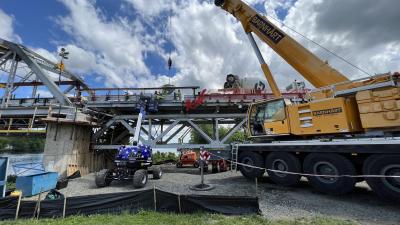Located on a 266-acre site, the new $83.5 million Greenfield water treatment plant for Huntsville Utilities will be the most expensive construction project in the utility’s 75-year history. When completed in March 2018, the plant is expected to treat 12 million gallons of drinking water per day.
“Demand for water from our system is regularly reaching 80 percent of our capacity,” said Joe Gehrdes, director of communications and public relations of Huntsville Utilities. “With water systems, 80 percent capacity demand tells you additional capacity is needed to insure the supply can continue accommodating demand, while also providing for growth. Discussion and design began after demand crossed that threshold. It really just took that much time to put a project of this magnitude together.”
Huntsville Waterworks was founded in 1823. Hollowed cedar logs were used as pipes, and a wooden storage tank served as a reservoir. It was Alabama’s first public water system. Today, the publicly-owned, not-for-profit utility serves 90,000 water customers in Madison County.
As for the site chosen for the new plant — near the intersection of Highway 431 and Guntersville Dam Road — Gehrdes called it a good fit.
“Huntsville Utilities has two existing surface water plants on the Tennessee River, so the position of this plant made perfect sense from a redundancy and system reliability perspective,” said Gehrdes.
The project will be funded with municipal bonds. The project includes a raw water intake structure, 42-in. (106.6 cm) raw water main pipelines, a conventional settling WTP and a 48-in. (121.9 cm) finished water main pipeline.
“The design is necessary for surface water treatment. Additional treatment is required to meet current and future drinking water regulations,” said Gehrdes.
“The timeline for project completion is approximately 30 months.
“A safe water supply is a foundational requirement for any community. We must be able to supply safe drinking water with the necessary capacity to provide what our community needs now and in the future,” said Gehrdes. “We are incorporating state-of-the-art security equipment into this project. Security is a very important aspect of any water supply.
“Water treatment of any kind is a huge responsibility. Water is essential for life, and our customers rely on us to deliver water that is dependable and safe. This added capacity will ensure that supply is always available, now and well into our future.”
Brasfield & Gorrie is serving as the general contractor. According to Ben Harris, Brasfield & Gorrie division manager, a notice to proceed was issued in March, 2015.
“This project encompasses two primary construction sites and over 10 miles of pipe lines. Right now we’re stripping top soil and the mass excavation has started. There are also mobilization activities underway installing laydown areas, construction entrances and temporary office space.”
There will be significant structural concrete work and over 10 mi. (16 km) of ductile iron pipeline work to complete the project. As for the raw water intake structure, Harris said it will require both on-shore and marine work that will be challenging from a geotechnical and environmental standpoint.
“However, our team has extensive experience in this work. The raw and finished water pipelines will require significant coordination, because most of it is located on the Alabama Department of Transportation’s right-of-way on Highway 431 and Guntersville Dam Road. Also, we expect to transport large earth moving equipment and pipelines to the site. Our goal is to minimize disruption to the normal flow of traffic along this busy corridor.”
Approximately 150,000 cu. yds. (114,683 cu m) of dirt is being moved during the construction. Heavy machinery being used on the project includes three 150-ton (136 t) crawler cranes, as well as multiple excavators and associated earth moving equipment.
The project consists of more than 20,000 cu. yds. (15,291 cu m) of structural concrete and almost 2,000 tons (1,814.3 t) of reinforcing steel. American Ductile Iron Pipe Company in Birmingham, Ala., will provide 23,000 linear ft. (7,010.4 m) of 42-in. (106 cm) and 35,000 linear ft. (10,668 m) of 48-in. (121.9 cm) ductile iron pipe for the water mains that will be installed by Garney Construction, a subcontractor to Brasfield & Gorrie. Shipment of pipe began in May.
“Our team is excited to work on this project, because the result will provide quality drinking water for residents, and upon completion, it will support the growth and development needs of the city of Huntsville and surrounding areas for years to come. A project of this type requires an experienced and dedicated construction team. We are fortunate to work with an experienced owner and world-class engineering firm on this construction project,” said Harris.
Tetra Tech Inc., a provider of consulting, engineering, program management and construction and technical services, is overseeing the work.
“The single largest challenge to the project was maintaining the patience and focus on what has been a 10-year process to get the project to construction,” said Christian Dunaway, Tetra Tech vice president. “We live in a very short-term world today, and the strategies that work in that world don’t always apply to projects of this scope, magnitude and schedule.”
Tetra Tech was responsible for assisting Huntsville Utilities in the siting, permitting, design and construction administration of the project. Tetra Tech began working with Huntsville Utilities in 2005 to determine a suitable location for a new water treatment plant. Over the next decade, the team performed the site selection study, water quality testing, technology pilot studies, permitting, design and bidding services. The project is expected to last three years.
The work consists of four major components, including the raw water intake structure, the raw water main, the water treatment plant and the finished water main. The raw water intake structure is located on the Tennessee River, and is responsible for pumping water from the reservoir approximately three mi. (4.8 m) through the raw water main to the water treatment plant. At the plant, the water will be treated and then pumped approximately eight miles through the finished water main to the existing Huntsville Utilities water system.
To determine the necessary treatment processes, Huntsville Utilities and Tetra Tech began a year-long water quality study to ascertain the makeup of the source water it would treat at the new treatment plant. After that data was compiled and analyzed, the team began a series of pilot tests to determine the most effective treatment options for the new plant, and focused particularly on disinfection byproduct control. Pilot testing included powdered activated carbon, granular activated carbon, biologically activated carbon, MIEX, MIOX, fixed bed ion exchange, membranes and chloramines. Conventional treatment processes with the addition of granular activated carbon was chosen.
Dunaway explained that 24-MGD will be the treatment capacity of the plant after it has been constructed and received its permits from the Alabama Department of Environmental Management (ADEM). Split treatment granular activated carbon is the treatment process chosen to control disinfection byproducts.
“Where chlorine is used as a disinfection agent, it can react with naturally present compounds in the raw water and produce a range of federal/state regulated disinfection byproducts,” Dunaway said. “The treatment processes have been chosen to exceed all current and future regulatory requirements for disinfection byproducts.
“Our job as a consultant is to work with our client, to present solutions that meet their financial constraints, schedule and all current and future regulatory requirements. Paramount to delivering a successful project is to partner with our client, to listen to our client and to respond to our client like they are our only client.
“Success hinges on having a client who’s knowledgeable in all aspects of water treatment, distribution and construction. From a project technical perspective, it’s vital to put your best team on the project, maintain team continuity, break down the large tasks into smaller manageable tasks and be prepared to hit change head-first.”
A number of the state and federal agencies had to approve the project before construction could begin, including the Tennessee Valley Authority, the Army Corps of Engineers and ADEM. Huntsville Utilities water supply superintendent Gary Bailey, who’s responsible for reviewing the design of the treatment plant and the pumping station and selecting acceptable equipment for the water treatment plant, is working closely with the contractor, Tetra Tech and ADEM to ensure the plant is built to specs and will function properly when completed. As the project progresses, any problems will be discussed with Huntsville Utilities and other parties involved to find the best solution and keep costs of the project within budget.
“With a project this large, a lot of time will be spent with Tetra Tech and the contractor addressing problems that will arise during construction on a daily basis,” Bailey said. “One must stay closely involved in a project of this nature, in order to work out issues as they occur, rather than allowing them to snowball into very costly problems. We will approach this as a team effort to make sure we stay ahead of issues.”
Bailey said it’s crucial the plant be built correctly and that provisions for future regulations be considered.
“Keeping costs under control is extremely important to maintain our customers’ trust. This water plant will serve future generations, and it’s a great responsibility knowing what we do now will affect this area for many years to come. The greatest challenge is to incorporate future growth and regulations while keeping the costs under control and delivering our customers a great product.
“Huntsville Utilities is very conscious of the cost of the plant and we have worked very hard to make sure resources have been used wisely. The quality of drinking water is something we will not compromise. Having a safe, adequate supply of water will help our area continue to grow, which provides jobs for the residences. Delivering safe drinking water to our customers is a 24/7, 365 job, and one that is not taken lightly. We know we’re doing our job when customers turn on their faucets and always have a plentiful supply of safe drinking water, while never giving it a second thought.”
Huntsville Utilities is currently reaching the capacity of its water system during peak periods. Bailey said the new plant will provide the additional capacity needed for many years to come, while continuing to allow new industries to locate in Madison County.
“The plant is being designed so that it can easily be expanded in order to meet future growth for our customers. The plant will also add more redundancy to our water supply so that we can make sure that our customers have a continuous supply of safe drinking water. This plant will be our third surface water plant on the Tennessee River and will allow a plant to be taken off line for maintenance and / or upgrades while still supplying our customers with water.
“I think our customers’ support of Huntsville Utilities building a new water plant speaks highly of them. In the early 1960s, it was decided to build a water plant that has allowed our area to grow while providing customers with a plentiful supply of safe drinking water. Many areas of the country are facing water shortages and are forced to limit water to industry and customers, which has caused the costs of water to skyrocket. The decision to build a new plant will not only meet our current demands, but also enable this area to continue to grow and provide jobs for our children and grandchildren.”
Today's top stories















